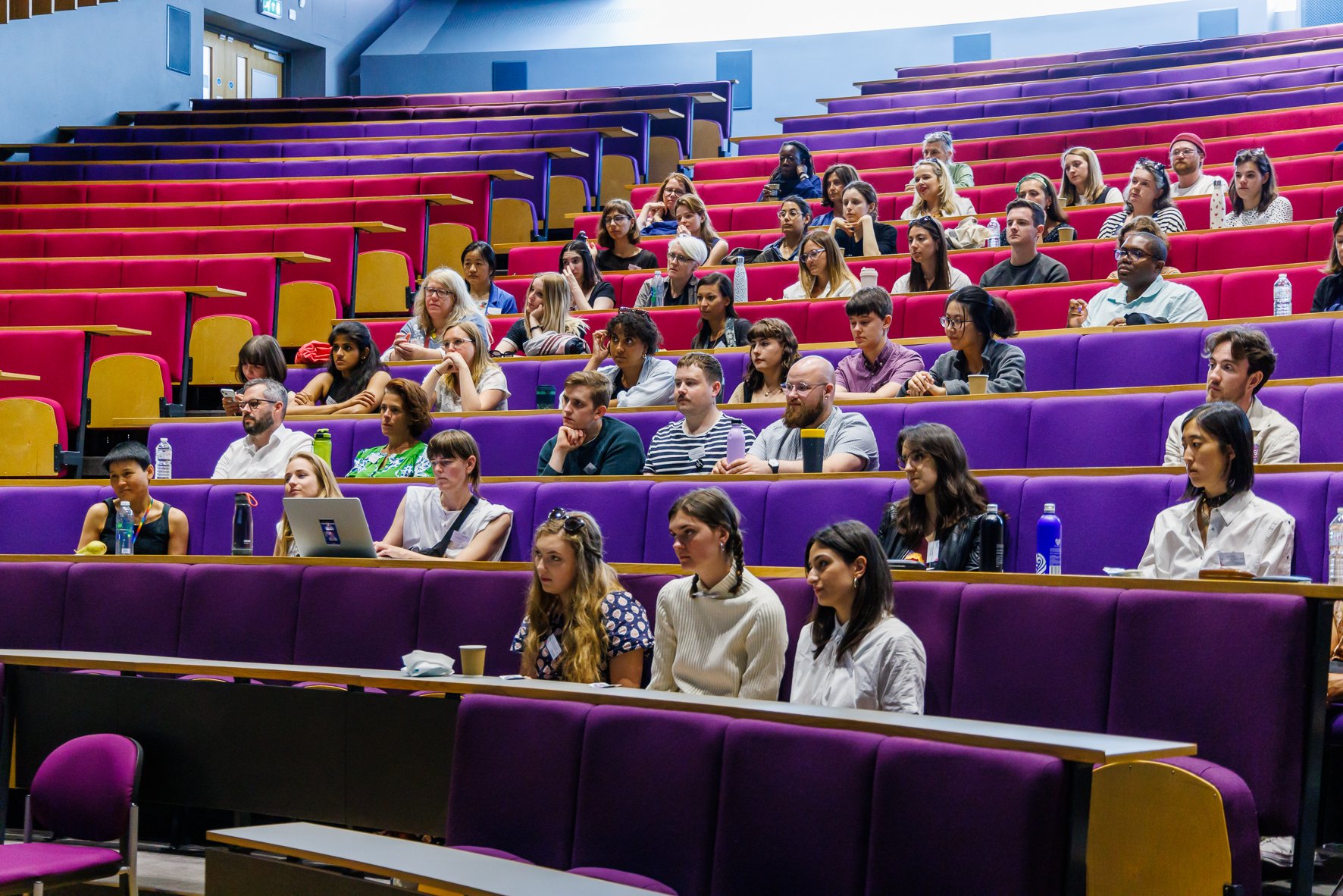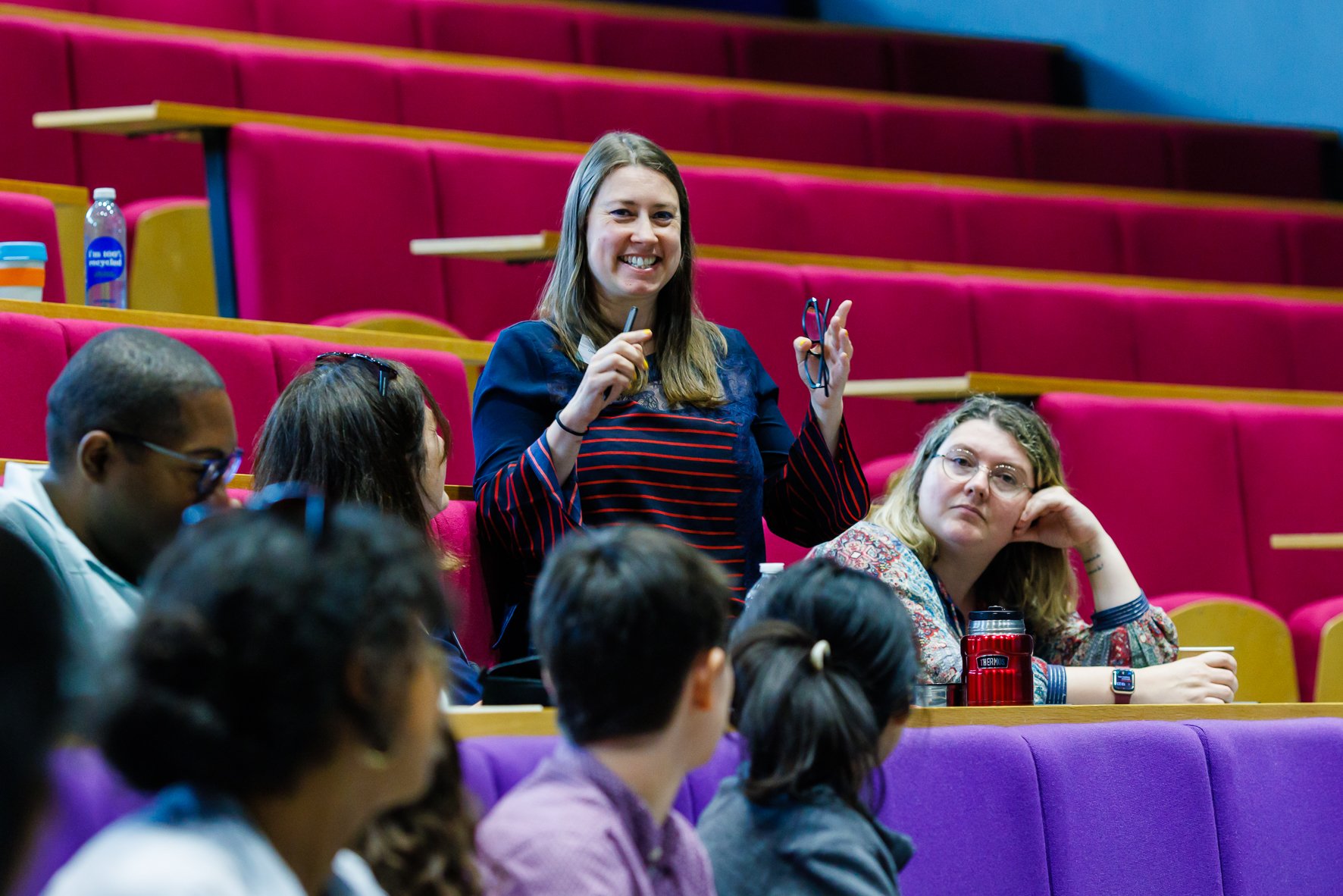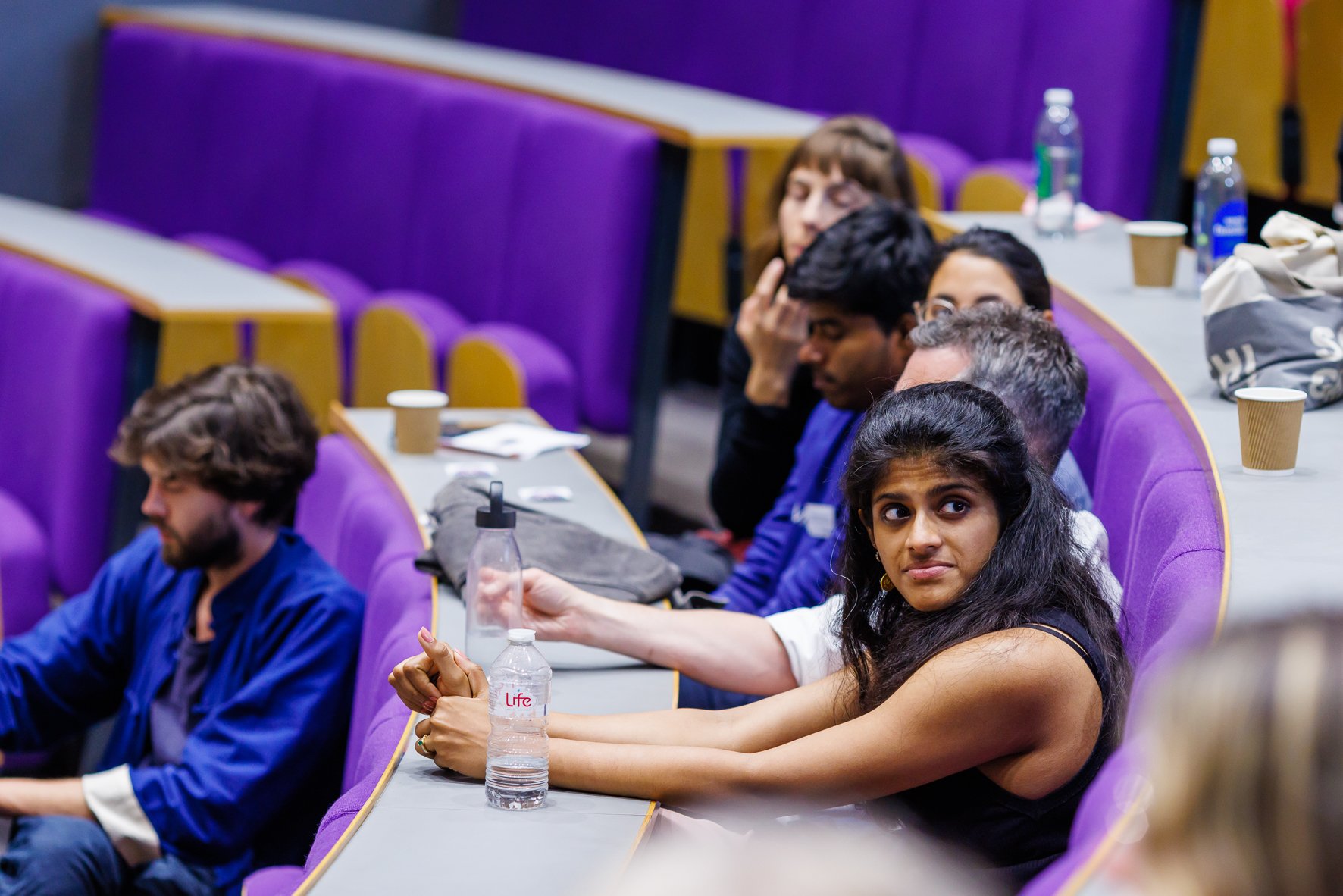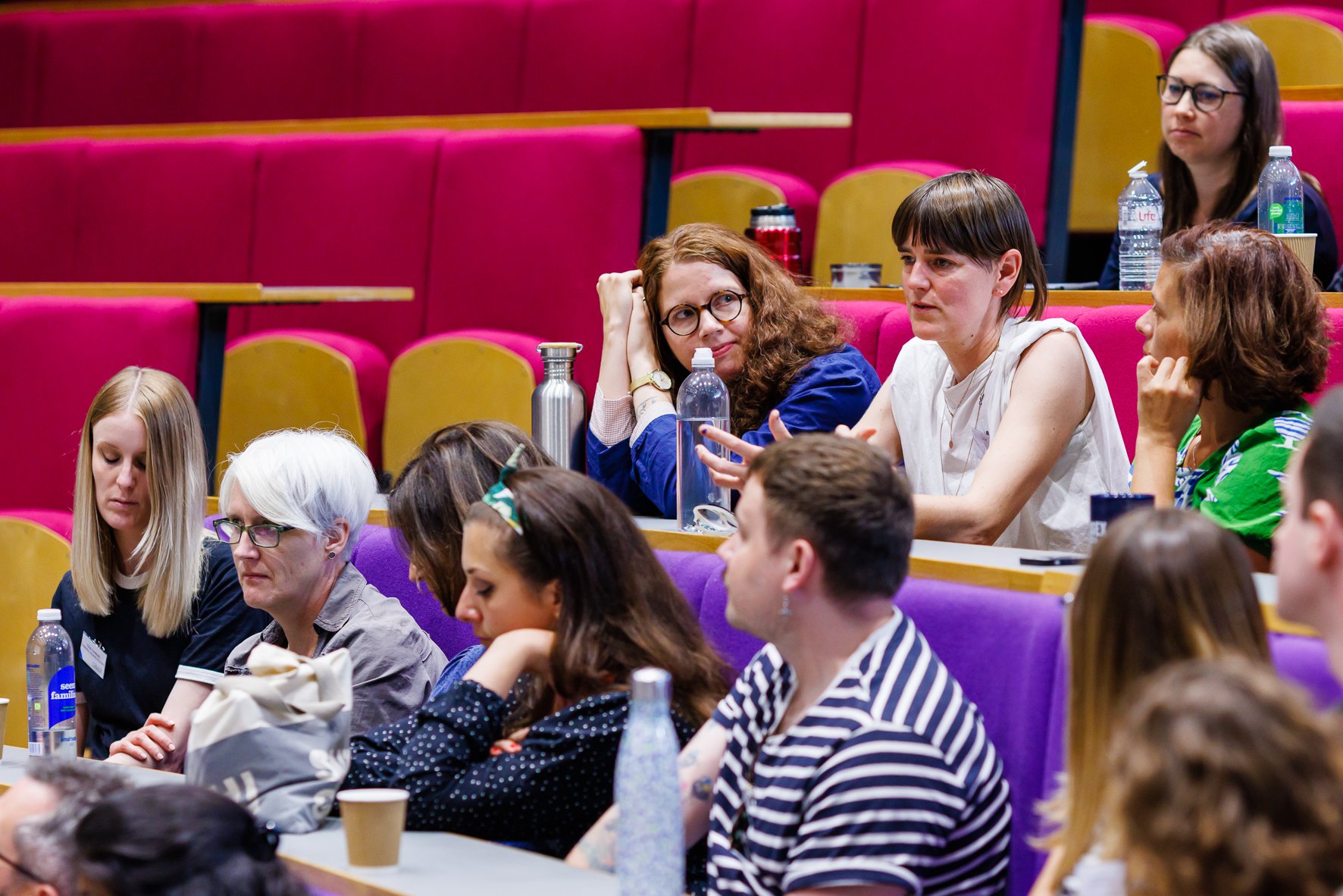
Peer Review in the Arts and Humanities (in person)
This workshop for researchers seeking to publish in peer-reviewed journals focuses on the key criteria involved in journal editors’ selection processes and peer-review, and how to meet them. Based on the inside knowledge of an experienced academic publisher, it is designed to develop essential skills in writing articles in order to increase researchers’ chances of placing their work in premium scholarly journals, to the benefit of their academic profile and career prospects.

Touching Language: A Somatic Voice Workshop - workshop 1
This practice-based workshop will explore the many ways we might activate and experience our voice, both as a physical organ and philosophical concept of expression and sensation across multiple mediums (including writing, performance, video, sound, sign language, creative captions, audio description).

From Drafting to Crafting (in person)
Writing is a dance between two processes: the creative process (drafting) and the critical process (crafting), which are separate, yet overlapping. The first half of this workshop will give you tools to get your raw material onto the page, to interrogate your ideas more deeply, and to find your own unique voice. Next, you will step into the shoes of your reader and revise your material so as to make your ideas clear to follow and compelling to read. Students are asked to have a draft section of their thesis in mind to work on during the course.

Assertive Communication Skills for Researchers (online)
This programme offers an array of assertive approaches that help you assess your current responses to situations and people, and identify what you'd like to change in the way you communicate in certain situations.

Getting Published (online)
Writing research papers as a doctoral student can be daunting. This half-day workshop aims to make the process of identifying what might work as a paper, as well as how to write it, that little bit easier.

RESONATE - SINGING AS LIFE PRACTICE
As part of the EMBODY series, this workshop aligns with our mission to provide a space for scholars and researchers to apply creative tools from the world of performance and voice training to explore our psycho-social lived experiences.

Touching Language: Sensory Documentation and Experimental Description - workshop 2
This workshop will focus on creative forms of description, documentation, and access.

Writing a Narrative CV (online)
This interactive workshop demystifies and simplifies the process of writing a narrative CV. Through discussion, activities, and examples, you’ll learn how best to present your research story.

Second Year Writing Retreat (in person)
We meet you ‘as writers’ and reflect on the challenges that all writers face. Perhaps you’re in the ‘Muddled Middle’, feeling your research proliferate, bringing you original plans into question. Can you re-orientate yourself with skilful questioning and feedback from your peers?

Getting Writing Done: How to Avoid Perfectionism and Finish that Draft (online)
Are you struggling with the tyranny of the blank page? Is your writing progress imperceptible to the naked eye? In this interactive and supportive session, you’ll break free from perfectionism, conquer writer’s block, and unleash your creativity. You’ll also apply the techniques to create a short piece of writing.

Thinking like an Editor (in person)
This workshop addresses the all-too-common problem of front-loading the writing process, whereby some students spend the bulk of their time researching, leaving their write-up until the end, with too little time for thinking. We instill early on a habit of multiple drafting and polishing.

Storytelling for researchers: preparing to present your research (online)
This workshop focuses on the preparation for talking about your research, rather than the delivery of presentations. By using storytelling techniques and focusing on the message, this workshop will help researchers communicate their passion to any audience. There are four key parts to the the workshop: audiences, storytelling structures, storyboarding, visual aids.

How to Craft an Argument (online)
This half day workshop will equip you with the skills to identify and shape a thorough, clear, logical, relevant, and critical argument that makes an original contribution to your field.

Exploring post-PhD routes (online)
This 1-month programme will help you identify strengths and explore post-PhD options. The how2glu approach is practical, responsive and action-oriented. The programme has three main components: x1 online workshop, a coaching session and an online toolbox.

Introduction to the UK Research Environment (online)
In this interactive workshop we will aim to de-mystify the policies and processes of research funding, exploring how doctoral research fits within the funding environment and examining the types of funding that might be available to you during and beyond your doctoral studies.

Publishing Scholarly Monographs in the Arts and Humanities (in person)
This workshop given by an experienced publishing professional is designed to demystify the task, shedding light on the decision-making process and helping researchers considering book publication to present their work to publishers in the best way.

Preparing for your Viva (online)
This interactive session guides you through the process of preparing for your viva and giving your best possible performance on the day. Through activities, discussion, and short training sessions, you’ll learn lots of techniques for successfully defending your thesis.

The Procrastinator's Guide to Writing a Journal Article (online)
Do you put off writing journal articles until the last moment? Are you feeling overwhelmed by looming deadlines and blank screens? In this interactive and supportive session, you’ll discover effective techniques for planning, writing, and editing your article.

Bookscapes in Essex
We are delighted to announce the next instalment of Bookscapes, a series of workshops thinking about the materiality of libraries and books across the medieval and early modern periods.

Career planning and making good decisions (online)
The purpose of this workshop is to help researchers to learn how to think strategically about career planning and to make decisions in which they can have confidence throughout their career. It encourages doctoral researchers to take a big picture view of the way they plan and manage their post-PhD careers.

Chronohacking: Time Management for Doctoral Researchers (online)
This workshop helps doctoral researchers to be strategic with time allocation and, from that, the confidence that they can set and meet deadlines. It looks at the challenges faced by doctoral researchers, including competing demands within the PhD itself, side projects, and other personal factors such as family commitments, working style, and neurodiversity, to ensure any strategy promotes rather than detracts from wellbeing.

Writing Articles for Peer-Reviewed Journals in the Arts and Humanities with Josie Dixon (in person)
This workshop for researchers seeking to publish in peer-reviewed journals focuses on the key criteria involved in journal editors’ selection processes and peer-review, and how to meet them.

Collaborative and Ethical Research Methods (online)
This training will focus on ethical and collaborative interview and research methods that focuses on the specifics of data collection and ongoing, participant informed consent.

Old English Language Training
This short course, available for graduate students at CHASE-affiliated institutions, aims to develop participants’ ability to read (in print and manuscript) and to interpret Old English texts.

From Drafting to Crafting
You have reams of research, numerous bits of writing that need to be joined into a single narrative, rough thoughts and notes, teeming references. How do you bring these into coherence and begin refining your narrative?

Encounters
CHASE Encounters Conference Autumn 2024
Temporal Tapestries: Weaving Memory, Time, and Future Visions in Research
Tuesday 26 & Wednesday 27 November | Online
Call for Contributions
The theme for this year’s autumn Encounters, Temporal Tapestries: Weaving Memory, Time, and Future Visions in Research, places an emphasis on the interconnectedness of past, present, and future within research practice, highlighting a rich, complex exploration of how different temporal perspectives influence academic inquiry.
This conference invites CHASE-funded researchers to consider and engage with the theme in a variety of ways, whether by investigating the layers of memory, examining the ways in which time structures knowledge production, or envisioning futures through academic, artistic, or creative practices. The idea of ‘weaving’ suggests the blending of these timelines into a coherent whole, challenging participants to consider time as both linear and nonlinear, fragmented and cohesive. The conference aims to foster a multidisciplinary dialogue on how these dynamics shape and influence research practices across fields.
The broad and interpretive nature of the theme invites submissions from a range of disciplines and encourages you to explore diverse landscapes of time. How does the past inform present research? How are future visions shaped by historical understanding? What methodologies can best capture the complex relationships between these temporal frames? We welcome innovative and interdisciplinary contributions that explore how time frames intellectual, creative, and practical inquiry.
Image credit: Národní filmový archiv / National Film Archive, Prague. Photographs by Barbara Flueckiger https://filmcolors.org/timeline-entry/1264/

How to be a better researcher with True North
This half-day workshop will help you make the most out of the research that you’ve already done, by making you aware of a method we’ve adapted from the Johari Window for categorising knowledge and knowledge-finding.

Thinking like an Editor with True North
This workshop addresses the all-too-common problem of front-loading the writing process, whereby some students spend the bulk of their time researching, leaving their write-up until the end, with too little time for thinking.

Reading like a Writer with True North
In this workshop we introduce you to a forensic approach to reading. We’ll explore how the writers you admire capture and hold your attention, looking for what works – and what doesn’t work.

Neurodivergence and the PhD Experience
Are you a neurodivergent student thinking of doing a PhD in humanities? Then this symposium is for you!
Here you’ll get to listen to current PhD students, alumni, and UEA’s student support service to find out what the PhD experience is like, and how you can be supported along the journey.
We will be joined by Brian Irvine, the developer of the first framework for Specialist Autism Mentoring in UK Higher Education.
Lunch will be provided.
Contact Cassia Hayward-Fitch at c.hayward-fitch@uea.ac.uk if you have any questions or would like further information

CHASE Dialogues - Climate Justice and the Arts
CHASE Dialogues is a discussion series foregrounding the significant roles the arts and humanities have played and continue to play in big discussions today in collaboration with STEM-related fields.
CHASE Induction
1100 Arrival and Registration
1130 —1200 Welcome and Introductions - CHASE team, EDI ambassadors (?) and DRC
1200 —1300 Informal Networking Lunch
1300 —1430 Brilliant Club introduction & CHASE Networks session
1430 —1500 Break
1500 —1600 CHASE Opportunities session
1600 —1700 Informal Networking and refreshments
Pre-conference training: Sit up and pay attention! Writing impactful conference abstracts and presentations Jamie Pei
Join Jamie Pei for this training to sharpen your conference skills and make your next presentation a resounding success!
Crafting a standout conference abstract or paper can be challenging, especially for researchers new to the conference scene. This workshop aims to demystify what makes an abstract or presentation successful and provides practical guidance for conceptualising, creating, and writing impactful content that gets noticed.
In this session, you’ll learn how to:
Conceptualise highly relevant, standout topics for conference presentations
Compose abstracts that align with conference themes to boost your chances of acceptance
Structure and write a compelling presentation that effectively communicates your key arguments or findings
You’ll also learn how to work with a suitable level of academic and technical language; and how to tailor your content for maximum engagement and impact among your audience.
The final part of the workshop focuses on mastering the Q&A session. You'll gain strategies to navigate this often-intimidating segment, reframing it as an opportunity for dialogue and knowledge exchange. Plus, we’ll break down common types of questions and offer tips on how to respond confidently.

CHASE Medieval French training 2024-25
The training will take place fortnightly on Wednesdays from the 2 October, with a total of 6 sessions in the autumn.
TIMES TBC
French was one of the most widely-spoken vernaculars in medieval Europe and beyond, extending far beyond the confines of what we today call ‘France’ to encompass parts of Italy, the Low Countries, and even the Middle East. The best-known example of medieval French in use outside France is in the Kingdom of England, where in the centuries following the Norman Conquest, it was a language of the nobility, the law courts, and administrative classes. Across this broad swathe of the medieval world, French was also a rich literary language, used to write epics and romances, saints’ lives, histories, administrative and technical texts, and much more. For students researching the literature, history, or languages of medieval Europe, an ability to read medieval French opens up new avenues of study, connects texts and places, and offers a deeper insight into the medieval world.
This course, aimed at postgraduate researchers, will introduce participants to medieval French materials, and offer the tools to read and interpret texts written in French between the 11th and 16th centuries. The course is divided into two strands (Beginners and Improvers). Participants are welcome either to join both strands or to attend the one that would be most useful. Both strands run across six structured sessions, taking place fortnightly.
The ‘Beginners’ strand will run during the Autumn term. It is aimed at students with little or no modern French, or more advanced students who would like to develop a more thorough understanding of the fundamentals of medieval French grammar.
The ‘Improvers’ strand will begin the following January, and will take the form of a guided reading group, with a different type of text to be studied each week in accordance with participants’ own research interests. In addition to covering more advanced aspects of medieval French grammar, sessions will explore dialectal and diachronic variation in medieval French, the particularities of specific genres, and palaeography and manuscript transcription.
Classes will be conducted online, via Teams, and will be led by Dr Edward Mills. There will be no formal assessment on the course, but students will be expected to complete relevant preparation (of up to an hour) in advance of each class.
The expected learning outcomes of the course (across both strands) are as follows:
An introductory knowledge of the grammar and vocabulary of medieval French.
An ability to read and translate medieval French materials, including manuscripts.
An awareness of the range of texts available in medieval French, and their relationships with texts in other languages of medieval Europe.
An awareness of the existing resources for research in medieval French.
If you would like to participate in the training, please fill out this form. If you have any questions, please do not hesitate to contact Emily Dolmans (e.dolmans@uea.ac.uk).

Embody Series: Creative Writing Workshop Text/Subtext
Wednesdays September 18, 25 & Friday September 27, 1300-1500
In this creative writing workshop, we will focus on the early part of creation, by disarming and preparing ourselves to discover stories from embodied lived experiences.

Playing, listening, measuring: methods for considering climate in/justice in research
Please join us for the double launch of Chase Climate Justice Network’s Considering Climate Podcast and Climate Justice Conversations Cards, along with a workshop by Shinji Toya about the carbon cost of digital technologies.

Medieval Books across Borders – call for papers
Books may be chained or locked in cases but they are by their nature hypermobile. Both their contents and their histories bear witness to the interactions of cultures. This is the theme of the next Bookscapes event, to be held on 14th September 2024 at the University of Kent.

Field Trip: Windworks
In our fourth network event, the AuralPluralities Network presents its first field trip! We will explore gusty Shetland, listening and swaying with the isle's infamous air flows, an abundant natural resource we will honour as the centre point and compass of our research.

Media training workshop - publicising your research through the media with MPI
This two half day (9.15 to 13.00 each day) online Media Workshop led by Media Players International is for research students who want to publicise their work in the non-specialist media.

AuralPluralities | CHASE Research Network
In our third network event, the AuralPluralities Network presents Annie Goh, Sandra Kazlauskaite and Marie Thompson, whose practices are entwined by way of a shared critical interest in gender, technology and auditory culture in relation.

Creative Writers Network Event
Date & Time: Thursday, 27 June 2024 @ 7pm GMT
Location: ZOOM, link coming soon
Topic: Making research writing personal
Register: Email chase.creative.network@gmail.com
Autoethnography, aka including personal details in your academic writing, is a practice some PGRs embrace. Others less so. Join us as we discuss the ins and outs of this practice, review the work of creative writers who have aced this technique, and debate whether it strengthens or harms academic research. This session is open to all PGRs from CHASE Universities. You do not need to be CHASE funded to attend.
CONNECT WITH US
Email: chase.creative.network@gmail.com
X: @CHASE_writers

Introduction to the UK Research Environment with Research Coach
In this interactive workshop we will aim to de-mystify the policies and processes of research funding, exploring how doctoral research fits within the funding environment and examining the types of funding that might be available to you during and beyond your doctoral studies.
All Consuming AI: Societal & Cultural Impacts
Location: The University of Sussex, Falmer Campus and online
Date: 25 June 2024
Hosted by the Sussex Humanities Lab with support from the CHASE Feminist Network
The meteoric evolution and rise in the popularity of AI in recent years has led to both enthusiastic embrace by techno-optimists and cautionary cynicism by critics. What has been advancing quietly in the backdrop since the earlier days of computation has now pervaded mass imagination through its integration into our most commonly used digital technologies. The far-reaching impact of this spans disciplines and industries, with both immediate repercussions to address and far-off consequences we can only speculate on. Bridging the discourse on AI between disparate fields of study is more pressing than ever as the chasm in levels of AI literacy continues to widen.
This interdisciplinary research symposium, hosted by the Sussex Digital Humanities Lab, will take place both online and at the University of Sussex. It comprises research presentations, panel discussions, a keynote speaker and networking opportunities, and key topics will include AI Behaviour, Cultural Narratives and Depictions of AI, and Speculative AI Realities.
This event is supported by the CHASE Feminist Network.

How to build and measure impact
This 2 hr 15 minute online workshop will help you understand the principles of different kinds of impact (academic, societal and economic), how to identify the intended impacts of research and potential beneficiaries, how to plan activities that will help achieve those intended impacts and how to measure progress towards these impacts.

Broadly Conceived, Book Launch: Responsible Pleasure
About
To mark the release of her new book, Responsible Pleasure, the Brook Advisory Centres and Youth Sexuality in Postwar Britain, historian Professor Caroline Rusterholz will be in conversation with:
Tracey Loughran, Professor of History, University of Essex;
Alison Hadley, Director of Teenage Pregnancy Knowledge Exchange, University of Bedfordshire, and Chair of the Sex Education Forum. Former Press and Information Officer, then Policy and Media Manager in Brook's National Office (1986-2000);
Lisa Hallgarten, Head of Policy and Public Affairs, Brook;
Samuel Yosef, PhD Student and Chair of the Board of Trustees of the Reproductive Justice Initiative.
Together they will explore the role of the Brook Advisory centres in providing sexual and reproductive health services in postwar Britain and the state of sexual and reproductive health services today.
This event is supported by Broadly Conceived.
Reception
Following the panel discussion, in-person guests are invited to join us for an informal drinks reception.
Location
This event will be held in Room 201 at 373 Euston Road (a Birkbeck, University of London building).
In-person Registration
https://www.eventbrite.com/e/book-launch-responsible-pleasure-tickets-872591975087
Online Attendance
In-person tickets are limited. To register for online attendance, please follow this link.
Support Brook
For 60 years Brook has been leading the fight for safe, confidential and accessible healthcare. In their 60th year, they need your support. Donate now.


Working with Difficult Stories. Strategies to Care for Researchers and Their Subjects
In this two day workshop we want to explore ways of managing this ‘secondary trauma’ for researchers, drawing on our own experiences and practices and those of the experienced researchers who will lead the individual sessions.





